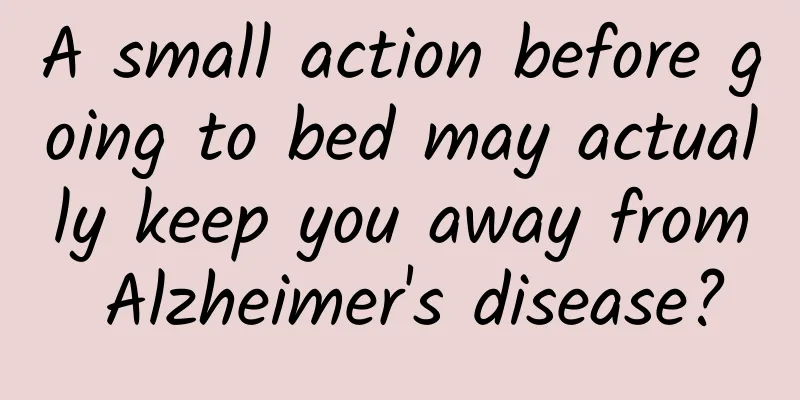A small action before going to bed may actually keep you away from Alzheimer's disease?

|
Perhaps, you who live in the city always enjoy being awakened by the sunshine in the morning, but have to live with the light coming in from the window at night; or perhaps, you who always get up at night are used to leaving a night light on for your convenience. However, a study published in Frontiers in Neuroscience in September 2024 showed that these lights that accompany you while you sleep will not only affect your rest, but may also increase the risk of Alzheimer's disease. However, it should be noted that this study is currently only a cutting-edge study, so it only proposes this possibility and cannot draw a definite conclusion, but it provides new ideas for further understanding Alzheimer's disease and reducing the risk of Alzheimer's disease. Light pollution significantly linked to Alzheimer's risk The researchers of this study compared the light pollution conditions in 48 states of the United States with the local medical records. Surprisingly, they found a significant positive correlation between light pollution and Alzheimer's disease. This coincidence also aroused the interest of researchers. Light pollution and Alzheimer's disease in each U.S. state They then made a more detailed division of the affected groups. For people over 65, risk factors for Alzheimer's disease include alcoholism, chronic kidney disease, depression, diabetes and high blood pressure, and the degree of light pollution is only one of the risk factors. For people under 65, light pollution levels may be the number one factor affecting the risk of Alzheimer's disease among the many factors evaluated in the study. However, it should be noted that this only proves that there is a correlation between light pollution and Alzheimer's disease, and cannot prove a causal relationship . How does light pollution affect our bodies? So, how does light pollution affect our body? To explore this question, the researchers arranged 20 participants to sleep in a dim room and a room with the lights on, and monitored their heart rates simultaneously at night. The results showed that the subjects who fell asleep in a room with the lights on had a faster heart rate, which meant that their sympathetic nervous system was overactivated, myocardial contractility increased, and blood flow accelerated . The body, which should have gotten enough rest at night, still did not get rest at night, and all this was simply because they spent a night exposed to light. Heart rate of subjects in light and dim conditions After they woke up, the researchers also tested their insulin secretion, and the results showed that their insulin resistance increased and the original glucose balance was disrupted, which increased the risk of diabetes. Some researchers exposed rats to night light and found that the density of dendritic spines in the hippocampal neurons of these rats decreased after 3 to 8 weeks. Related behavioral experiments also showed that these rats became depressed and lost the motivation to be happy. Therefore, the destructive power of light pollution may be far beyond our imagination . Light pollution can cause insomnia Insomnia may worsen Alzheimer's disease In addition, the most direct impact of light pollution on us is that it can cause insomnia . In a Korean experiment investigating light pollution and insomnia, about 22% of the 52,000 subjects took insomnia drugs, and the more severe the light pollution, the higher the proportion of taking insomnia drugs . This is because the pineal gland in the brain can sense light, and when there is sufficient light, it will inhibit the secretion of melatonin, disrupting the circadian rhythm and causing insomnia. Copyright images in the gallery. Reprinting and using them may lead to copyright disputes. Insomnia is closely linked to Alzheimer's disease. Researchers selected 511 subjects for basic tests and re-examined them four years later. The results showed that the more severe the insomnia symptoms, the worse their performance in subsequent cognitive tests . This was particularly evident in carriers of the APOE ε4 (Alzheimer's risk gene) allele, suggesting that insomnia may be particularly harmful when the brain is already susceptible to neurodegeneration, which is truly adding insult to injury. It needs to be emphasized again that this research is still in the exploratory stage and has not been concluded yet. You can just take a look at it . However, this interesting research provides new ideas for Alzheimer's disease research. Perhaps one day we can have a deeper understanding of this disease and help more people stay away from Alzheimer's disease. But then again, light pollution can indeed cause insomnia, especially for people with poor sleep. It is recommended that you maintain a dark sleeping environment when you sleep. References [1]Robin M. Voigt, Bichun Ouyang, Ali Keshavarzian. Outdoor nighttime light exposure (light pollution) is associated with Alzheimer's disease. Frontiers in Neuroscience (Sec. Neurodegeneration), 2024, 18: 1378498. DOI: 10.3389/fnins.2024.1378498. Published: 06 September 2024. https://doi.org/10.3389/fnins.2024.1378498 [2]Kloog I, Haim A, Stevens RG, Portnov BA. Global co-distribution of light at night (LAN) and cancers of prostate, colon, and lung in men. Chronobiol Int. 2009;26:108–25 [3]JY Min, KB Min, Outdoor Artificial Nighttime Light and Use of Hypnotic Medications in Older Adults: A Population-Based Cohort Study, (1550-9397 (Electronic)). [4]Mason IC, Grimaldi D, Reid KJ, Warlick CD, Malkani RG, Abbott SM, Zee PC. Light exposure during sleep impairs cardiometabolic function. Proc Natl Acad Sci US A. 2022 Mar 22;119(12):e2113290119. doi: 10.1073/pnas.2113290119. Epub 2022 Mar 14. PMID: 35286195; PMCID: PMC8944904. [5]William H. Walker, Jeremy C. Borniger, Acute exposure to low-level light at night is sufficient to induce neurological changes and depressive-like behavior, https://doi.org/10.1038/s41380-019-0430-4 [6]Min JY, Min KB. Outdoor Artificial Nighttime Light and Use of Hypnotic Medications in Older Adults: A Population-Based Cohort Study. J Clin Sleep Med. 2018 Nov 15;14(11):1903-1910. doi: 10.5664/jcsm.7490. PMID: 30373695; PMCID: PMC6223552. [7]Andrée-Ann Baril, Alexa S Beiser, Erlan Sanchez, Vincent Mysliwiec, Susan Redline, Daniel J Gottlieb, George T O'Connor, Mitzi M Gonzales, Dibya Himali, Sudha Seshadri, Jayandra J Himali, Matthew P Pase. Insomnia symptom severity and cognitive performance: Moderating role of APOE genotype. Alzheimers Dement. 2021 Jul 26. doi: 10.1002/alz.12405. Planning and production Author: Ding Yu, PhD in Neurobiology Reviewer: Li Jingjing, Professor and Chief Physician, Department of Neurology, Beijing Tiantan Hospital Yu Zhouwei, attending physician of neurology department, author of "Sleep Formula" Planning丨He Tong Editor: He Tong Proofread by Xu Lai and Lin Lin |
<<: This "nemesis" of the African giant snail was found in inland China for the first time
>>: Draw a "circle" to save the planet's "neighbor"丨International Biosphere Reserve Day
Recommend
The colors of fruits are not just for the eyes! Please "see the colors" →
Fruits are not only sweet, but also contain a var...
There is a kind of bank whose "benefits" we all enjoy unintentionally
Produced by: Science Popularization China Author:...
What is the reason for accelerating the construction of a unified national market? What kind of national unified market should be built?
On April 10, the "Opinions of the CPC Centra...
Besides rewards, what else are users interested in?
We want users to take action, but when inducement...
Apple releases important iOS 14.8 update: All updates are required to fix security vulnerabilities
Apple today released iOS 14.8, the eighth major u...
Subsidy and payment: How do products make the transition from "subsidy" to "payment"?
We found that many newly launched Internet produc...
The outlook for Android is not optimistic. The deployment rate of the new version has dropped by 20%.
According to foreign media reports, compared with...
The latest Baidu information flow product manual, giving you a comprehensive understanding of Baidu products
This article shares with you the latest " Ba...
How is the random algorithm of WeChat red envelopes implemented?
I saw a question on Zhihu: How is the random algo...
NSA cracks German Chancellor's encrypted phone again
German media reported that the US National Securit...
It’s so fast that even Nezha can’t catch up. Why is the cheetah so fast?
Review expert: Wang Lei, National Park and Nature...
Is it possible for humans to achieve "immortality"? What conditions are needed and what problems need to be solved?
When I see some friends answering questions like ...
Community Operation | Master these 3 steps to make your community "live"
Most people who run communities have experienced ...
I rubbed my eyes and saw strange patterns. Did I peek into the secrets of heaven?
After using our eyes for a long time, our eyes wi...
Tips for APP promotion, double the effect!
Many optimizers often encounter such troubles dur...









